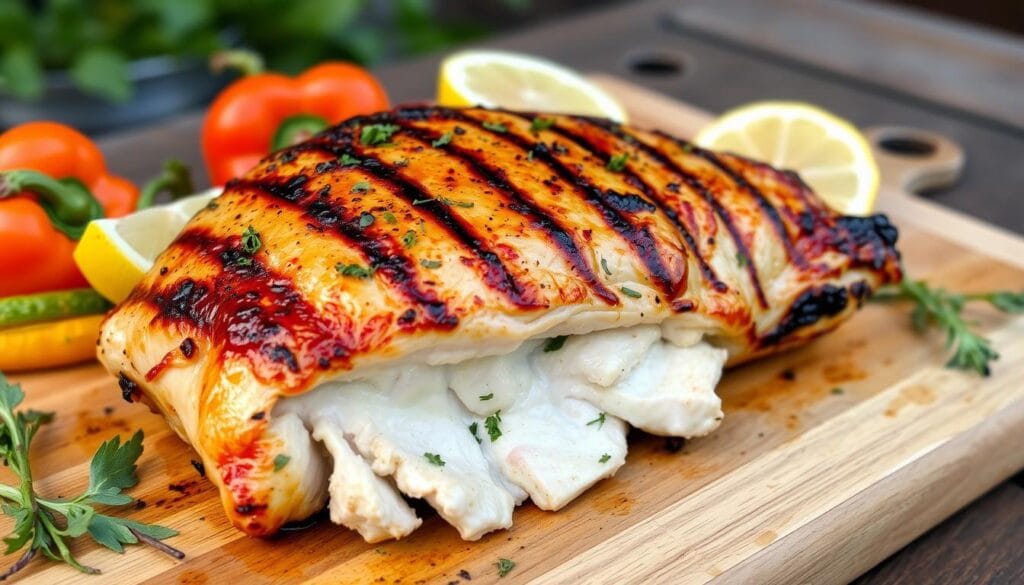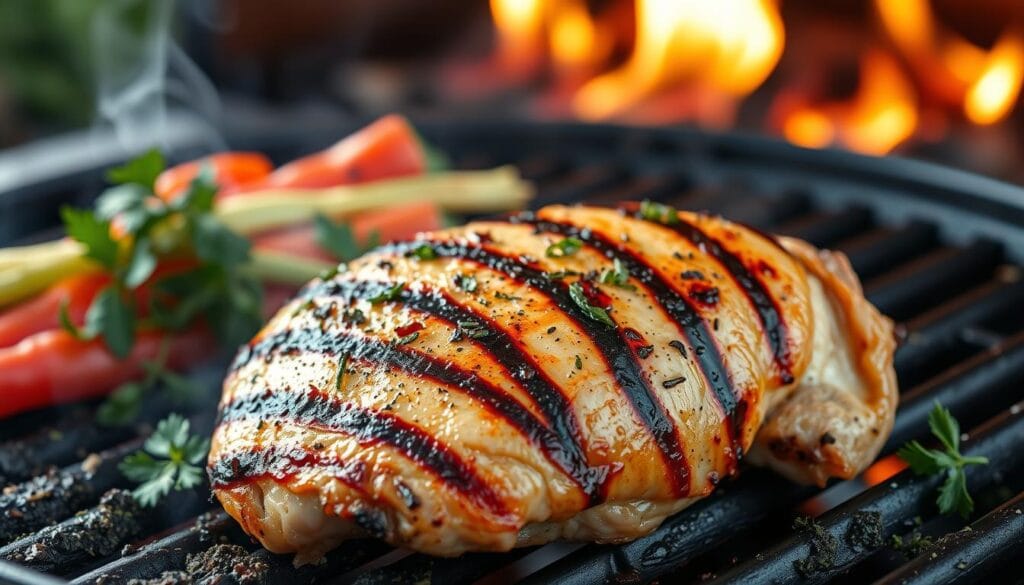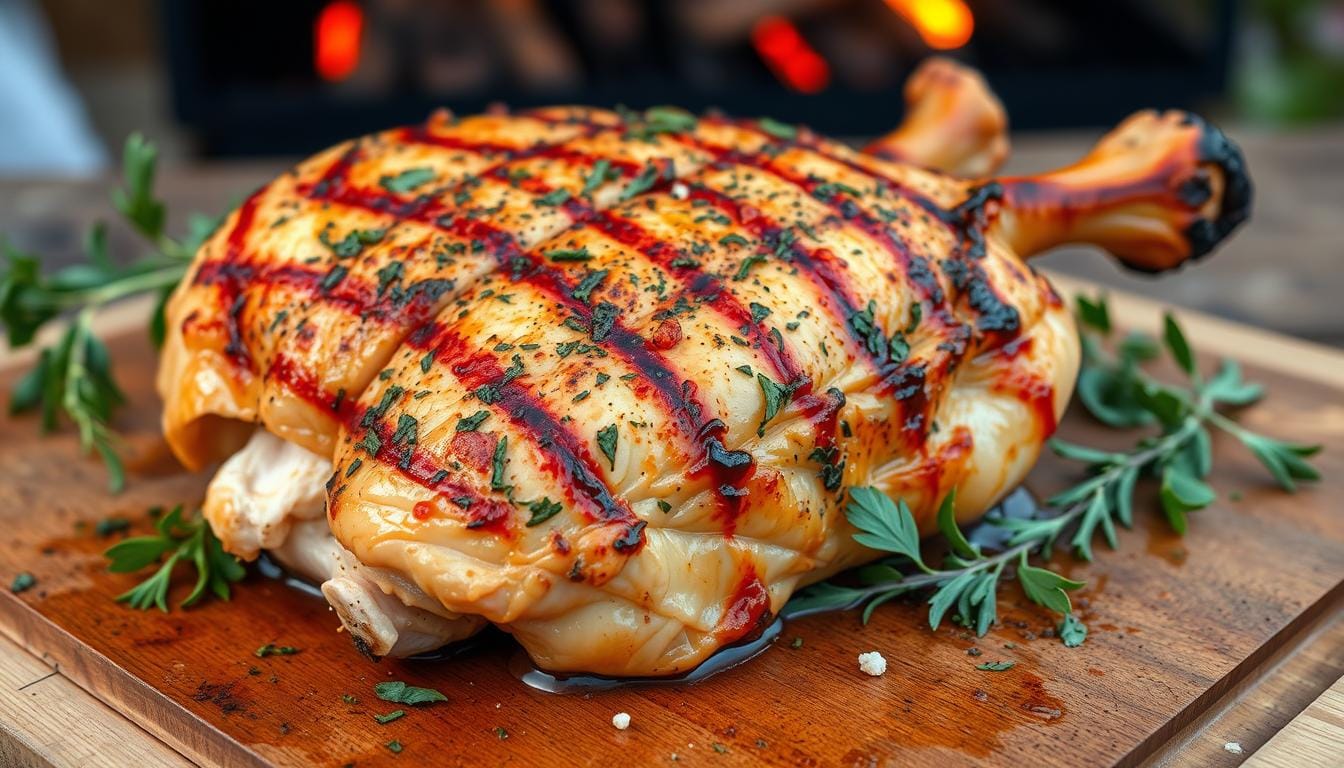Grilled Bone In Chicken Breast: How to Best Get Juicy Chicken
Have you ever stood by the grill, ready to make a delicious chicken dish, only to end up with dry, flavorless meat? You’re not alone. Grilling bone in chicken breast can be challenging, but with the right techniques, you’ll achieve juicy, flavorful results every time.
I still remember the aroma of my grandmother’s grilled chicken filling the backyard, drawing everyone to the table. The crispy skin and tender, juicy meat were summer classics. Over the years, I’ve discovered just how crucial the right grilling approach is, and I’m excited to share my tips for perfectly grilling bone-in chicken breasts.
Introduction to Grilled Bone In Chicken Breast
Grilled chicken is a go-to favorite, perfect for barbecues and family gatherings. Its appeal lies in its versatility and health benefits. However, achieving that juicy, crispy texture can be challenging, particularly with bone-in cuts.
The Popularity of Grilled Chicken
Grilled chicken is an affordable option, ideal for budget-conscious cooks. Cuts like chicken breasts or thighs cook quickly, making them perfect for weeknight dinners or impromptu barbecues. For bone-in pieces, the indirect heat method works best, allowing for even cooking without charring the skin.
The Challenge of Juicy, Flavorful Grilled Chicken
Marinades and brines enhance moisture, giving chicken a juicy, flavorful bite. Each chicken part benefits from a tailored grilling approach for the best results. While rubs and sauces elevate flavor, avoiding overcooking is essential to prevent dry, tough meat.
“Finding the ideal balance between juicy, tender meat and a crispy, flavorful skin can be challenging, especially with bone-in chicken breasts on the grill.”
Why Choose Bone-In Chicken
Opting for bone-in chicken breasts when grilling adds both flavor and juiciness. The bones help retain moisture and bring out a deeper, richer taste while also promoting even cooking for tender, delicious results.
The Importance of Bone-In for Flavor
Bone-in chicken breasts are perfect for grilling because they’re packed with natural flavor and tend to be juicier than boneless cuts. The bones act as insulators, distributing heat evenly and helping the chicken stay tender. For grilling, bone-in, skin-on chicken is best, as the skin becomes crispy and adds a savory layer to every bite.
- For a deliciously smoky flavor, try marinating the chicken in herbs, garlic, and citrus for at least 30 minutes before grilling.
- To ensure even cooking, place the chicken over indirect heat first, then finish it off on direct heat for that beautiful golden-brown sear.
- Using a meat thermometer helps you avoid overcooking while reaching a safe internal temperature of 165°F (74°C).
When selecting chicken, choose pieces with firm, pinkish-red meat and smooth, translucent skin. Steer clear of any meat that appears discolored or slimy. For the best grilling results, opt for bone-in, skin-on chicken breasts, as they remain juicier and more flavorful.
“Grilled bone-in chicken breasts stay juicier and have a richer flavor because the bone helps retain moisture, keeping the meat tender throughout the cooking process.”
Preparing Bone-In Chicken for Grilling
For the perfect grilled chicken, start with high-quality bone-in chicken breasts. Choosing the right chicken is crucial for a flavorful meal.
Selecting Quality Chicken
Look for fresh, plump bone-in chicken breasts, free from excess moisture or fat. Opt for chicken that is raised without hormones or antibiotics to ensure a cleaner, more authentic flavor.
Dry-Brining for Juicy Chicken
Dry-brining is key to achieving juicy, flavorful chicken. To dry-brine, season the chicken with kosher salt and let it rest in the fridge for 2 hours or overnight. The salt draws out moisture, which is then reabsorbed, making the chicken tender and flavorful.
For dry-brining, pat the chicken dry with paper towels, then season evenly with salt. Place the chicken on a wire rack set over a baking sheet and refrigerate it uncovered. This process helps the chicken retain moisture during grilling.
By choosing high-quality chicken and dry-brining it, you’ll ensure your grilled bone-in chicken breasts are irresistibly juicy and delicious.
Grilled Bone-In Chicken Breast: Step-by-Step
Grilling bone-in chicken breasts is an enjoyable cooking experience that brings out juicy, flavorful results. It’s a great way to make the most of the chicken’s natural taste and tenderness.
- First, heat your grill to 350°F. Ensure your grill features both direct and indirect heat zones.
- Gently pat the chicken breasts dry using paper towels, then coat with salt and pepper.
- Lightly oil the grill grates. This helps the chicken not stick.
- Put the chicken on the indirect heat zone. Close the lid and let the chicken cook for approximately 15 minutes.
- Flip the chicken over and cook for another 10 minutes on the indirect heat side.
- Move the chicken to the direct heat zone and sear it for around 5 minutes per side. Check the internal temperature with a thermometer to confirm it hits 165°F.
- Let the chicken rest for 5-10 minutes. This lets the juices spread evenly.
By following these steps, you’ll get grilled bone-in chicken breasts that everyone will love.
| Preparation Time | Cooking Time | Total Time | Internal Temperature |
|---|---|---|---|
| 40 minutes | 30 minutes | 70 minutes | 165°F |

“The key to tender, tasty grilled bone-in chicken lies in the cooking method. Use these steps to ensure a delicious result every time.”
Mastering Grill Setup and Temperature Control
To grill the perfect bone-in chicken breast, it’s important to manage the temperature effectively. Utilize both indirect and direct heat zones on your grill. This technique ensures even cooking, helps the chicken stay juicy, and gives it a crispy, golden-brown exterior.
Creating Indirect and Direct Heat Zones
To grill bone-in chicken breasts perfectly, set up two heat zones on your grill:
- Direct Heat Zone: This side is for searing the chicken and creating grill marks. Aim for a temperature of around 400°F (204°C).
- Indirect Heat Zone: The cooler side, set between 325-350°F (163-177°C), is where the chicken will cook through slowly, preventing it from drying out.
Using a meat thermometer is essential to ensure your chicken is perfectly cooked. Make sure the internal temperature reaches 165°F (74°C) before removing it from the grill. It’s best to take it off the grill at 160°F (71°C), as the temperature will continue to rise by 5-10 degrees during the resting periodt.
Proper grill setup and temperature control are the secrets to juicy, flavorful grilled bone-in chicken breasts. By using both direct and indirect heat, you’ll achieve a perfect sear while keeping the chicken tender and moist.
Cooking Techniques for Juicy Grilled Chicken
Achieving juicy, flavorful grilled chicken requires mastering two key techniques: searing and finishing. Alternating between direct and indirect heat zones helps you achieve a crispy skin while keeping the meat tender and moist.
Searing for Flavor and Texture
Begin by searing bone-in chicken breasts over direct, high heat. This quick, high-temperature cooking browns the skin, locking in juices and giving it a golden, flavorful crust. Set your grill to 375-400°F (190-204°C) and cook each side for about 6 minutes, or until the skin is well-charred.
Finishing with Indirect Heat
After searing, move the chicken to indirect heat. This gentler heat cooks the interior without over-browning the outside. Cover the grill and cook until the internal temperature reaches 165°F (74°C), typically another 10-16 minutes.
Give the chicken a 5-10 minute resting period before you slice into it. This short wait allows the juices to redistribute, ensuring each bite is moist and flavorful.

Try using wood chips like hickory, apple, or cherry for extra smoky flavors that elevate the chicken’s taste.
Grilled Bone-In Chicken Breast Recipes
Grilled bone-in chicken breast recipes provide countless possibilities. This cut’s natural flavor and juiciness pair wonderfully with a range of dry rubs and barbecue sauces. Experiment with smoky, savory, or tangy-sweet glazes to take your grilled chicken to the next level.
Dry Rub for Grilled Chicken
Try this flavorful dry rub:
- 1 tsp salt
- 1/4 tsp black pepper
- 1/4 tsp cayenne pepper
- 1 tsp garlic powder
- 2 tsp smoked paprika
- 1/2 tsp onion powder
- 1 tsp brown sugar
Massage this spice blend onto the bone-in chicken breasts before grilling.
Barbecue Sauce for Grilled Chicken
For a barbecue sauce with a perfect balance of tangy and sweet flavors, give this a try:
- 1 cup ketchup
- 1/4 cup apple cider vinegar
- 2 tbsp brown sugar
- 1 tbsp Dijon mustard
- 1 tsp Worcestershire sauce
- 1/2 tsp chili powder
- 1/4 teaspoon cayenne pepper (Optional, depending on how spicy you like your sauce.)
Simmer the ingredients in a saucepan for 10-15 minutes, stirring frequently, until the sauce thickens. During the final few minutes of grilling, brush the sauce onto the bone-in chicken breast for a delicious glaze.
“The secret to Juicy, flavorful grilled bone-in chicken comes down to the perfect mix of seasoning and cooking technique.”
Serving and Pairing Suggestions
Grilled bone-in chicken breasts are a flexible main course that pairs well with a variety of side dishes. Consider these tasty options to elevate your grilled chicken meal.
Side Dish Ideas for Grilled Chicken
- Crisp and refreshing garden salad
- Sautéed zucchini with garlic and herbs
- Creamy mashed potatoes
- Fluffy rice pilaf or herbed couscous
- Roasted sweet potato wedges
- Grilled corn on the cob topped with butter and a sprinkle of spices.
- Garlic parmesan cauliflower rice
- Balsamic marinated grilled vegetables
These side dishes provide a wonderful variety of flavors and textures, making them the perfect match for grilled chicken. Whether you’re looking for something light and refreshing or rich and filling, you’ll find the ideal pairing.
| Side Dish | Pairing Suggestion |
|---|---|
| Caesar Salad | Grilled Bone-In Chicken Breast |
| Avocado Salsa | Grilled Bone-In Chicken Breast |
| Mexican Rice | Grilled Bone-In Chicken Breast |
These side dishes for grilled chicken offer a wonderful mix of flavors, textures, and health benefits. Experiment with different combinations to discover the perfect pairing that complements your grilled chicken perfectly.
Grilled Bone-In Chicken Breast Benefits
Grilled bone-in chicken breasts are not only delicious and juicy but also packed with health benefits. As a lean protein, they are ideal for those seeking a nutritious and versatile food option.
Nutritional Value and Versatility
A 3-ounce serving of grilled, boneless, skinless chicken breast contains 128 calories, 26 grams of protein, and just 2.7 grams of fat, with no carbs. This lean protein is rich in essential vitamins and minerals, including riboflavin, niacin, pantothenic acid, vitamin B6, vitamin B12, iron, zinc, phosphorus, potassium, selenium, and choline. It provides all the amino acids required for muscle growth and repair, making it a great choice for a healthy diet.
Grilled chicken breast is incredibly versatile and can be incorporated into a wide range of dishes, including salads, sandwiches, soups, and casseroles. Its healthy profile makes it a popular choice for health-conscious individuals and families.
| Nutrient | Amount per 3 oz Serving | % Daily Value |
|---|---|---|
| Calories | 128 | – |
| Protein | 26 g | – |
| Total Fat | 2.7 g | – |
| Saturated Fat | 0.8 g | – |
| Cholesterol | 88 mg | 29% |
| Riboflavin | 0.2 mg | 17% |
| Niacin | 10.6 mg | 67% |
| Pantothenic Acid | 1.5 mg | 30% |
| Vitamin B6 | 1.0 mg | 77% |
| Vitamin B12 | 0.2 mcg | 8% |
| Iron | 0.7 mg | 5% |
| Zinc | 0.8 mg | 8% |
| Phosphorus | 217 mg | 31% |
| Potassium | 253 mg | 11% |
| Selenium | 31 mcg | 44% |
| Choline | 85 mg | 19% |
| Sodium | 51 mg | 2% |
Grilled chicken breast is not only nutritious, but it also supports metabolism, weight management, and muscle repair. The tryptophan in chicken can help improve mood and memory, while selenium plays a role in supporting thyroid health.
While grilled chicken breast is typically a healthy option, those with poultry allergies or following a plant-based diet should be cautious. However, the many benefits of grilled bone-in chicken breasts make them a valuable addition to a balanced diet.
Storage and Leftovers
You can enjoy your grilled bone-in chicken breasts even after the meal by storing leftovers properly. Here’s how to keep your chicken fresh and ready for future meals.
Refrigerator Storage
Cooked grilled chicken can last in the fridge for 3 to 4 days, according to the USDA. Store it in an airtight container and label it with the date you cooked it for safety and quality.
Freezer Storage
For long-term storage, freeze grilled chicken breasts for up to 3 months. Wrap them tightly in plastic or foil, or use a freezer-safe bag to keep the chicken fresh and flavorful.
Reheating Leftover Chicken
To ensure food safety, reheat your leftover chicken to an internal temperature of 165°F. You can reheat it in the oven, microwave, or stovetop, but be careful not to overcook it, as this can dry it out. Use a meat thermometer to check the temperature and keep it juicy and tender.
Repurposing Grilled Chicken
Leftover grilled chicken is versatile and can be added to many dishes, like salads, soups, sandwiches, or used as a topping for pasta or rice. Its bold flavors complement a variety of ingredients.
| Storage Method | Shelf Life |
|---|---|
| Refrigerator | 3-4 days |
| Freezer | Up to 3 months |
Proper storage and creative use of leftover grilled chicken can help you enjoy its flavors for days to come while reducing food waste. With a little planning, you can keep the meal fresh and versatile, turning leftovers into new and exciting dishes.
Conclusion
Grilling bone-in chicken breasts is an excellent way to create juicy, flavorful dishes that everyone will enjoy. It’s a versatile protein that can be prepared in a variety of ways, whether with a dry rub, tangy barbecue sauce, or other seasonings. By following the tips and techniques in this article, you’ll be able to grill bone-in chicken to perfection every time, delighting your family and friends with delicious meals.
Choosing high-quality chicken, brining for added moisture, properly setting up your grill, and mastering cooking techniques are all crucial steps in ensuring the best grilled chicken. Each of these factors contributes to the final result: tender, flavorful, and perfectly cooked chicken.
With these guidelines, you’re ready to impress your guests with juicy, perfectly grilled bone-in chicken. Get your grill going and elevate your next barbecue with these tips!

